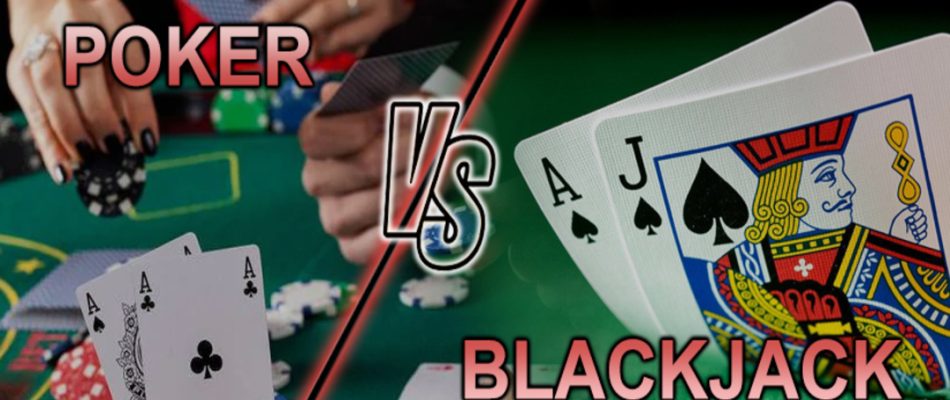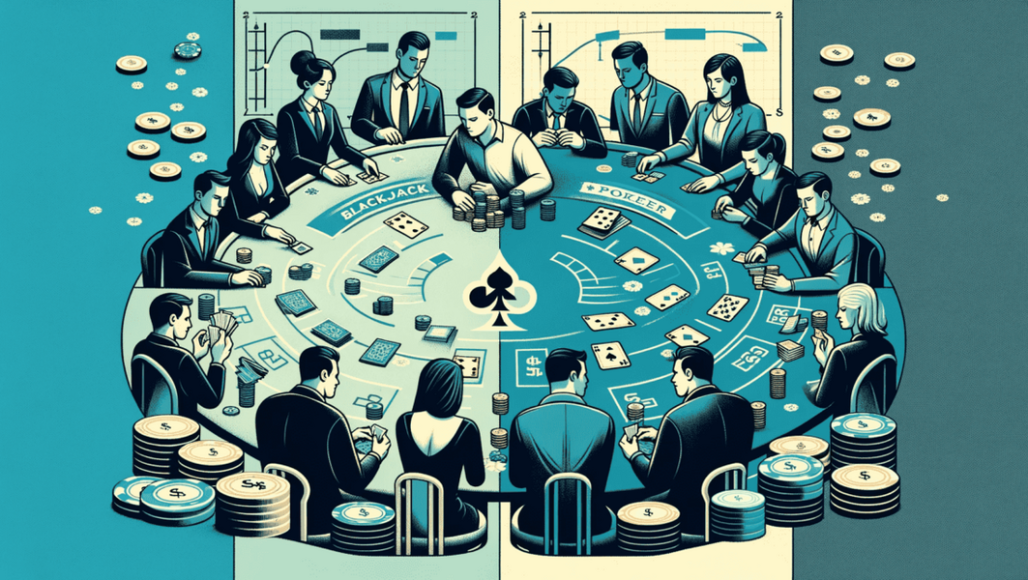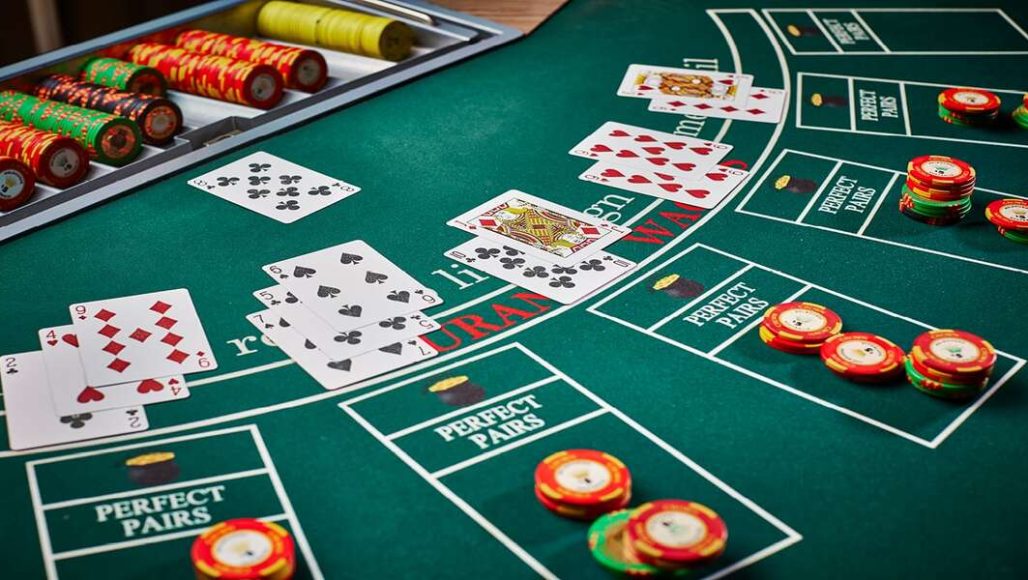Poker vs. Blackjack: A Comparison of Two Iconic Games

When stepping into a casino, two of the most iconic games that vie for attention are poker and blackjack. Each game carries its own allure, promising excitement, strategic depth, and the chance to walk away with substantial winnings. But when it comes down to it, how do these games truly compare? Is poker or blackjack more profitable? What is the difference between blackjack and poker? And perhaps most intriguingly, is blackjack a form of poker? This review will delve deep into these questions, providing a thorough, unbiased comparison between poker and blackjack.
Understanding the Basics
Poker is often regarded as the quintessential card game, celebrated for its blend of skill, strategy, and psychological warfare. Whether it’s Texas Hold’em, Omaha, or Seven-Card Stud, poker is a game where players compete against each other rather than the house. This dynamic is critical, as it means that the primary challenge is outwitting your opponents rather than merely playing the odds.
In poker, players are dealt a set of cards, and the objective is to form the best possible hand according to the game’s rules. Success in poker hinges on understanding the odds, reading opponents, and mastering the art of bluffing. It’s a game where long-term success is often determined by the player’s ability to think several moves ahead, manage risk, and maintain composure under pressure.
Blackjack, on the other hand, is a game of mathematics, simplicity, and rapid decision-making. Unlike poker, blackjack pits the player directly against the dealer. The goal is straightforward: get a hand total as close to 21 as possible without exceeding it. Each card has a point value, and players must decide whether to “hit” (take another card) or “stand” (keep their current hand) based on their total and the dealer’s visible card.
Blackjack’s appeal lies in its relatively simple rules and the immediacy of each round. However, beneath this simplicity lies a game that is rich in strategy, particularly in terms of understanding probabilities and making quick, calculated decisions. Card counting, while not illegal, is a controversial strategy that some skilled players use to gain an edge over the house.

Profitability: Which Game Offers Better Returns?
When asking, “Is poker or blackjack more profitable?” the answer largely depends on the player’s skill level. Poker is a game where, over the long term, a skilled player can consistently earn money. Because poker is played against other players, a strong player can exploit the weaknesses of less experienced opponents. The concept of expected value (EV) is crucial in poker; over time, players with positive EV in their decisions will profit.
In poker, the house takes a “rake,” a small percentage of each pot, which is how the casino makes money from the game. However, this rake is relatively small compared to the potential profits skilled players can earn. Many professional poker players make a living through the game, which speaks to its profitability for those who master its nuances.
Blackjack offers a different kind of profitability. The house edge in blackjack game is generally low, often around 0.5% with optimal strategy, making it one of the most favorable games for players. This low house edge means that, on average, players lose very little over time, and with the right approach, they can come out ahead.
However, blackjack’s history says its profitability is often more consistent but lower than poker’s potential returns. The game’s structure, where players are up against the dealer, means that big wins are less frequent, and long-term profits tend to be more stable but less dramatic. For those who prefer steady returns and less volatility, blackjack can be the better choice.
Ultimately, whether poker or blackjack is more profitable depends on the player’s skill and risk tolerance. Poker can offer higher profits for skilled players, especially in games with weaker opponents, but it comes with higher variance. Blackjack, while offering lower long-term profits, provides a more predictable and steady income stream, especially for players who adhere to basic strategy and perhaps even card counting.
Key Differences Between Blackjack and Poker
1. Player vs. Dealer vs. Player vs. Player
One of the most significant differences between blackjack and poker is who you’re playing against. In blackjack, the player is always up against the dealer, which simplifies the dynamics and makes the game one of probabilities and quick decisions. In poker, however, you’re playing against other players, adding layers of complexity, including psychological elements like bluffing and reading opponents.
2. Complexity and Strategy Depth
Poker is generally considered a more complex game than blackjack. While blackjack has a relatively straightforward strategy that can be memorized (basic strategy), poker requires a deep understanding of probabilities, psychology, and long-term strategy. The complexity of poker makes it a more challenging game to master, but it also means that skilled players can enjoy greater rewards.
3. Game Variants and Their Impact
Poker comes in many forms, each with its own rules, strategies, and complexities. Texas Hold’em is the most popular, but there are numerous other variants like Omaha and Razz, each offering a different twist on the game. Blackjack, while also having variants like Spanish 21 and Pontoon, is generally more uniform in its gameplay across different versions.
Is Blackjack a Form of Poker?

The question, “Is blackjack a form of poker?” is a common one, especially among those new to card games. The simple answer is no; blackjack is not a form of poker. While both games are card-based and involve elements of strategy, they are fundamentally different in terms of gameplay, objectives, and the skills required to succeed.
Poker is a group of card games where players compete against each other to form the best hand or to bluff opponents into folding. The various forms of poker all involve betting rounds and strategic decision-making based on incomplete information. Blackjack, by contrast, is a casino banking game where the primary goal is to beat the dealer’s hand by getting as close to 21 as possible without going over.
Choosing the Right Game for You
When deciding between poker and blackjack, it’s essential to consider your personal preferences, skill level, and what you hope to get out of the game. Here’s a simple breakdown to help you decide:
| Factor | Poker | Blackjack |
|---|---|---|
| Skill vs. Luck | Skill-heavy with elements of luck | Mostly luck with a small skill element |
| Potential Profits | High, especially for skilled players | Moderate, with consistent returns |
| Game Complexity | High, requires deep strategic thinking | Moderate, with basic strategy sufficing |
| Opponent | Other players | The dealer/ live dealer |
| Game Speed | Slower, with multiple betting rounds | Fast-paced, with quick decisions |
| Long-term Viability | Excellent for skilled players | Good for those who master basic strategy |
Conclusion
Both poker and blackjack offer unique experiences and opportunities for profit. Poker is a game of skill, strategy, and psychology, with the potential for significant long-term profits for those who master it. Blackjack, while simpler and more reliant on luck, offers a steady, consistent gaming experience with one of the lowest house edges in the casino.
So, is poker or blackjack more profitable? The answer depends on your skills and preferences. If you enjoy deep strategic thinking, psychological play, and the potential for big wins, poker might be your game. If you prefer quick decisions, a more straightforward strategy, and consistent returns, blackjack could be the better choice. In either case, understanding the difference between blackjack and poker is key to choosing the right game for you.
FAQ
The primary difference lies in who you’re playing against. In poker, players compete against each other, whereas in blackjack, the player is always competing against the dealer. This fundamental distinction affects the strategy, complexity, and dynamics of each game.
The profitability of poker vs. blackjack depends on the player’s skill level and approach. Poker can be more profitable for skilled players, especially in games with less experienced opponents. Blackjack offers lower, more consistent returns, particularly for those who adhere to optimal strategy.
Blackjack is generally easier to learn due to its straightforward rules and simpler strategy. Poker, while more complex, requires a deeper understanding of strategy, psychology, and game theory, making it more challenging to master.
No, blackjack is not a form of poker. While both are card games, they have different rules, objectives, and gameplay. Poker involves competing against other players to form the best hand or bluff opponents, while blackjack involves trying to beat the dealer by getting a hand total as close to 21 as possible.
It is possible to make a living playing poker, particularly for skilled players who consistently outplay their opponents. Some professional poker players earn significant incomes. Blackjack, while offering lower long-term profits, can provide a steady income for those who master strategies like card counting, but making a living from blackjack alone is more challenging.
Blackjack generally has a lower house edge, often around 0.5% with optimal strategy. In poker, there is no house edge in the traditional sense since players compete against each other. The casino typically takes a small percentage of the pot (known as the rake) in poker games.
Key strategies for poker include understanding the odds, mastering the art of bluffing, reading opponents, and managing bankroll effectively. Success in poker also depends on long-term strategy, patience, and the ability to make informed decisions under pressure.
In blackjack, basic strategy involves knowing when to hit, stand, double down, or split based on the player’s hand and the dealer’s visible card. Card counting can also be a useful, though controversial, strategy to gain an edge over the house.
Blackjack is generally faster-paced, with each round taking only a few seconds or minutes. Poker games, especially in formats like Texas Hold’em, can be slower, with multiple betting rounds and decisions to be made during each hand.